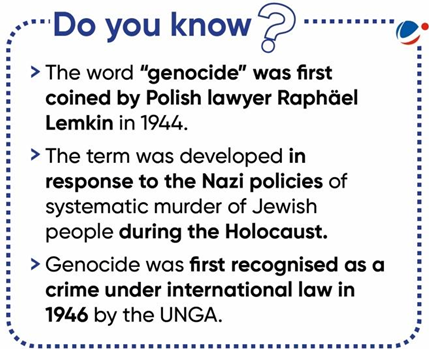Why in news?
The International Court of Justice (ICJ) gave its interim ruling on South Africa’s genocide case against Israel.
More on news
- South Africa vs. Israel case in ICJ: South Africa argued that the manner in which Israel was conducting its military operations in Gaza violated the Genocide Convention.
- Provisional Measures by ICJ: ICJ ruled that Israel must take all measures to prevent genocidal acts in Gaza (Palestine). However, it did not order ceasefire and did not find Israel guilty yet.

About Genocide convention
- Name: Officially known as Convention on the Prevention and Punishment of the Crime of Genocide, 1948.
- It codified the crime of genocide for the first time.
- It was also the first human rights treaty adopted by the UN General Assembly.
- Definition of Genocide: The crime of genocide is defined in Article II of the Genocide Convention.
- Genocide is defined as acts committed with the intent to destroy, in whole or in part, a national, ethnic, racial, or religious group.
- According to the convention, genocide is a crime that can take place both in time of war as well as in time of peace.
- Membership: The Genocide Convention has been ratified by 153 States. India has signed the treaty in 1949 and ratified in 1959.
- Responsibility of State parties: State have obligation not to commit genocide and to take measures to prevent and to punish the crime of genocide, including by enacting relevant legislation and punishing perpetrators.
- However, India did not enact any legislation on the subject.
- Jurisdiction: International Court of Justice (ICJ) hears cases related to the interpretation and application of the convention.
- Other key information: The definition of the crime of genocide, as set out in the Convention, has been widely adopted at both national and international levels, including in the Rome Statute of the International Criminal Court (ICC) (Article 6).
About International Court of Justice (ICJ)
| About International Criminal Court (ICC)
|






